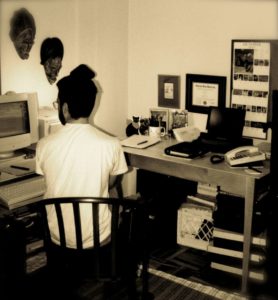
NOTES
I wrote this poem back in 1999. It likely requires a nerd to understand it, but there’s more and more of us out there every year.

NOTES
I wrote this poem back in 1999. It likely requires a nerd to understand it, but there’s more and more of us out there every year.
The Gate of Angels, Penelope Fitzgerald, Carrol & Graf, 1993 (c1990), ISBN 9780881849608, 352pp.
I can’t remember where I first heard of Fitzgerald, although I suspect it was from one of the well-read subscribers to Rondua, the Jonathan Carroll mailing list. She is not a magic realist or fantasy author (as far as I can tell from reviews of her work and the present volume), although the book in question could be considered a ghost story it one wanted to interpret it that way. Of the authors of my acquaintance, she most resembles Robertson Davies in style and form. I don’t think that I am creating a relationship based on subject material, although I must admit that Davies also wrote a couple of novels of love and the university, as well as a collection of ghost stories.
The year is 1912. Fred Fairly is a Young Fellow at Cambridge’s St. Angelicus College, which has fairly strict ideas on the proper conduct of its members, including a requirement of non-marriage. While biking, Fairly collides with an unlit cart and is injured. Upon regaining consciousness, he finds himself in a bed with a fellow victim, who, by circumstance and a gold ring on her fourth finger, is mistaken as his wife. Fred finds the prospect not displeasing.
In other hands–say P. G. Wodehouse or Thorne Smith–such a plot would be filled with spirited high jinx, including mistaken identities and timing difficulties. Fitzgerald’s humor is not of that sort. Like Davies, it derives less from exaggeration and more from verisimilitude. This is not to say that there are not amusing passages. I especially enjoyed Fred’s family: his suffragette mother and two younger sisters and his put-upon father, the Rector.
This is Fitzgerald’s eighth novel, and her ability in story and sentence construction is masterful. Although I found this book to be a little dry for my particular taste, I expect I will try a different vintage of hers at some later date.
[Finished 28 January 1998]
They tell you, in writing how-to books and workshops, don’t quit the day job. In today’s economy, however, quitting the day job isn’t so hard as finding a day job in the first place.
I moved from Los Angeles to Fort Collins, Colorado in August, 1991. My significant other was going for her master’s degree, and I was doing my part to equal the battle of the sexes by following along. We were happy to leave Los Angeles, for, although we both had nice jobs with nice pay, the cost of living took care of any extra money we were making, and the size of Los Angeles seemed to preclude any chance of having close friends. We expected Fort Collins to be much like Austin, Texas, where we had met. I knew that we would be happier than the self-enforced isolation of LA. What I didn’t know is that I would be unemployed for seven months.

It wasn’t because I was without abilities or skills. Like most writers, I am a jack-of-all-trades, moving from job-to-job in a never-ending quest for knowledge. Personally, I had never found a company that couldn’t use a typist or someone who was unafraid of the computer. And in Fort Collins, the same was true. Unfortunately, though, for every opening of this type, there were 80 other jobseekers with similar skills who were also applying for the same job, and many of them did have college degrees or other experience that I couldn’t match.
Before we moved, I sent out resumes, using an address list of the largest companies in the area provided by the Chamber of Commerce. When we visited Fort Collins in July to sign a lease, I subscribed to the Sunday paper and had it mailed to LA, and sent out resumes in response to classifieds. I should have been alarmed when first only negative responses were forthcoming, and often, no response at all. But I’ve always been an optimist, and felt that the problem was that I was not there in Fort Collins and that the jobs were for immediate filling only.me was true. Unfortunately, though, for every opening of this type, there were 80 other jobseekers with similar skills who were also applying for the same job, and many of them did have college degrees or other experience that I couldn’t match.
After I finally made the move, the situation didn’t change. As the weeks went by, I first applied with personnel offices, and then the temporary agencies. At the temporary agencies, I learned the other aspect of Fort Collins. Not only were jobs few and far between, I could only hope to make half the salary that I had received in Los Angeles. And, although we had reduced our rent and insurance, that was still a very tangible difference.
Then the weeks turned into months . Every morning I would get up and look at the classifieds, finding maybe three jobs a week to respond to if I was lucky. A visit to the Job Service Bureau might turn up another lead. As my significant other’s graduate friends (and their significant others) were telling me, things were tough all over. This girlfriend was working at the local bookstore for just slightly over minimum wage, although she had a master’s degree in finance. This boyfriend didn’t find a job for six months, this wife four months. I wasn’t alone, but sometimes there is little comfort in being just one of the crowd.
I made do, however. My former employer in LA had signed a consulting contract with me before I left, and sent a little work my way each month. I ate a little crow and worked for the temporary agencies for what I felt were substandard wages for my skills in order to make the rent. And Ikept an eye out for any openings.
Things came to a head in the first week of March. Successive weeks of frustration, the lack of temporary assignments and no work forthcoming from LA led me to sit in front of the computer, unable to write, but instead just vegetating, reading electronic messages like a zombie. The worsening bank account was something I didn’t want to reflect on, and I began turning to alcohol as a mind-number and time-condenser. And my relationship began to feel the strain. Fortunately, nothing broke. After the yelling, the tears, and the reconciliation, we talked. Her graduate friends (or, should I say, our friends, for they had befriended me as well as her) noticed my depression and were quick to offer sympathy and devices to help alleviate it. And things started to turn around.
Even when things were at their worst, I can see the items that raised my spirits. Joining the Internet provided me with another outlet for my idle fingers. My first published story appeared in Alternate Presidents in February. I made my second professional sale in March. I joined an online workshop in January, befriending a fellow spirit from Suffolk. And the support groups, from our graduate friends, to the online Delphi Wednesday Nighters, provided help and encouragement.
If you couldn’t tell, this story has a happy ending. After seven months of unemployment, and a two-and-a-half month application/testing/interview process, I landed a job as a Library Assistant with the local university. (Unknown at the time, I beat out the girlfriend of one of my graduate school friends.) I started in May, and life, and my finances, finally started to improve.
Never quit the day job, they say, until you are ready to support yourself with your writing income. There’s a corollary as well: Never take the day job for granted. I once thought the best thing for me would be to have my days free just to spend writing. How wrong I was.